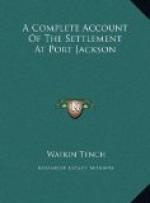Nothing farther of public nature remaining to examine, I next visited a humble adventurer, who is trying his fortune here. James Ruse, convict, was cast for seven years at Bodmin assizes, in August 1782. He lay five years in prison and on board the ‘Dunkirk’ hulk at Plymouth, and then was sent to this country. When his term of punishment expired, in August 1789, he claimed his freedom, and was permitted by the governor, on promising to settle in the country, to take in December following, an uncleaned piece of ground, with an assurance that if he would cultivate it, it should not be taken from him. Some assistance was given him, to fell the timber, and he accordingly began. His present account to me was as follows.
I was bred a husbandman, near Launcester in Cornwall. I cleared my land as well as I could, with the help afforded me. The exact limit of what ground I am to have, I do not yet know; but a certain direction has been pointed out to me, in which I may proceed as fast as I can cultivate. I have now an acre and a half in bearded wheat, half an acre in maize, and a small kitchen garden. On my wheat land I sowed three bushels of seed, the produce of this country, broad cast. I expect to reap about twelve or thirteen bushels. I know nothing of the cultivation of maize, and cannot therefore guess so well at what I am likely to gather. I sowed part of my wheat in May, and part in June. That sown in May has thrived best. My maize I planted in the latter end of August, and the beginning of September. My land I prepared thus: having burnt the fallen timber off the ground, I dug in the ashes, and then hoed it up, never doing more than eight, or perhaps nine, rods in a day, by which means, it was not like the government farm, just scratched over, but properly done. Then I clod-moulded it, and dug in the grass and weeds. This I think almost equal to ploughing. I then let it lie as long as I could, exposed to air and sun; and just before I sowed my seed, turned it all up afresh. When I shall have reaped my crop, I purpose to hoe it again, and harrow it fine, and then sow it with turnip-seed, which will mellow and prepare it for next year. My straw, I mean to bury in pits, and throw in with it every thing which I think will rot and turn to manure. I have no person to help me, at present, but my wife, whom I married in this country; she is industrious. The governor, for some time, gave me the help of a convict man, but he is taken away. Both my wife and myself receive our provisions regularly at the store, like all other people. My opinion of the soil of my farm, is, that it is middling, neither good or bad. I will be bound to make it do with the aid of manure, but without cattle it will fail. The greatest check upon me is, the dishonesty of the convicts who, in spite of all my vigilance, rob me almost every night.
The annexed return will show the number of persons of all descriptions at Rose Hill, at this period. On the morning of the 17th, I went down to Sydney.




